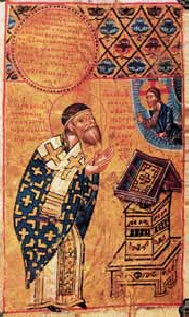Related Research Articles

Thomas Campion was an English composer, poet, and physician. He was born in London, educated at Cambridge, studied law in Gray's inn. He wrote over a hundred lute songs, masques for dancing, and an authoritative technical treatise on music.
Dyfnwal Moelmud was accounted as an early king and lawmaker among the Welsh, credited with the codification of their standard units of measure. He also figures as a legendary king of the Britons in Geoffrey of Monmouth's pseudohistorical History of the Kings of the Britons.
The English Madrigal School was the brief but intense flowering of the musical madrigal in England, mostly from 1588 to 1627, along with the composers who produced them. The English madrigals were a cappella, predominantly light in style, and generally began as either copies or direct translations of Italian models. Most were for three to six voices.

Sir Henry Savile was an English scholar and mathematician, Warden of Merton College, Oxford, and Provost of Eton. He endowed the Savilian chairs of Astronomy and of Geometry at Oxford University, and was one of the scholars who translated the New Testament from Greek into English. He was a Member of the Parliament of England for Bossiney in Cornwall in 1589, and Dunwich in Suffolk in 1593.
Colebrooke is a village and parish in Devon, England about 8 km west of Crediton. The main point of interest is the church and the connection to Henry Kingsley's novel The Recollections of Geoffry Hamlyn. Also Uncle Tom Cobley, of the folk song, signed his will at Pascoe House, but is buried 4 miles west at Spreyton. The champion Devon wrestler, Abraham Cann was born and buried here. He won the all-comers wrestling crown in London.
Robert Tounson — also seen as “Townson” and “Toulson” — was Dean of Westminster from 1617 to 1620, and later Bishop of Salisbury from 1620 to 1621. He attended Sir Walter Raleigh at his execution, and wrote afterwards of how Raleigh had behaved on that occasion.
Thomas Hood (1556–1620) was an English mathematician and physician, the first lecturer in mathematics appointed in England, a few years before the founding of Gresham College. He publicized the Copernican theory, and discussed the nova SN 1572.. He also innovated in the design of mathematical and astronomical instruments.
John Brinsley the Elder was an English schoolmaster, known for his educational works.

Sir William Fortescue of Buckland Filleigh, Devon, was a British judge and Master of the Rolls 1741–1749.

Sir John Moore was a British politician. He was the Member of Parliament for the City of London from 15 May 1685 to 9 January 1687, and Lord Mayor of London, 1681–82. He also invested in the slave trade.
John Bowack was a British topographer, for many years a writing-master at Westminster School.
Thomas Baker was an English dramatist and lawyer.
Sir Timothy Fetherstonhaugh was an English royalist during the English Civil War.
Thomas Talbot was an English antiquary.
Thomas Barclay was a Scottish jurist, professor at Toulouse and Poitiers.
Richard of Lavenham was an English Carmelite, known as a scholastic philosopher. He is now remembered for his approach to the problem of future contingents.
John Walton, also John Capellanus was an English Augustinian canon, known as a poet and translator.

Jakov of Serres was a medieval Serbian writer, scholar, translator, and hierarch of the Serbian Orthodox Church, one of the most important men of letters working in the 14th century.
References
- ↑ Lee, Sidney, ed. (1892). . Dictionary of National Biography . Vol. 32. London: Smith, Elder & Co.